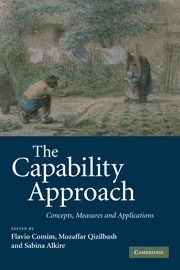Book contents
- Frontmatter
- Contents
- List of figures
- List of tables
- List of contributors
- List of acronyms
- Acknowledgements
- Introduction
- 1 Using the capability approach: prospective and evaluative analyses
- PART I Concepts
- PART II Measures
- PART III Applications
- 12 Democracy, decentralisation and access to basic services: an elaboration on Sen's capability approach
- 13 Reinforcing households' capabilities as a way to reduce vulnerability and prevent poverty in equitable terms
- 14 Capabilities over the lifecourse: at what age does poverty damage most?
- 15 Social policy and the ability to appear in public without shame: Some lessons from a food relief programme in Kinshasa
- 16 The capability approach and gendered education: some issues of operationalisation in the context of the HIV/AIDs epidemic in South Africa
- 17 Women and poverty in Mozambique: is there a gender bias in capabilities, employment conditions and living standards?
- 18 From the quantity to the quality of employment: an application of the capability approach to the Chilean labour market
- Index
- References
14 - Capabilities over the lifecourse: at what age does poverty damage most?
Published online by Cambridge University Press: 22 September 2009
- Frontmatter
- Contents
- List of figures
- List of tables
- List of contributors
- List of acronyms
- Acknowledgements
- Introduction
- 1 Using the capability approach: prospective and evaluative analyses
- PART I Concepts
- PART II Measures
- PART III Applications
- 12 Democracy, decentralisation and access to basic services: an elaboration on Sen's capability approach
- 13 Reinforcing households' capabilities as a way to reduce vulnerability and prevent poverty in equitable terms
- 14 Capabilities over the lifecourse: at what age does poverty damage most?
- 15 Social policy and the ability to appear in public without shame: Some lessons from a food relief programme in Kinshasa
- 16 The capability approach and gendered education: some issues of operationalisation in the context of the HIV/AIDs epidemic in South Africa
- 17 Women and poverty in Mozambique: is there a gender bias in capabilities, employment conditions and living standards?
- 18 From the quantity to the quality of employment: an application of the capability approach to the Chilean labour market
- Index
- References
Summary
Introduction
Consider the capabilities of two people, one an adult and the other a baby. In terms of capabilities, understood as ‘alternative things a person can do or be’, it is obvious that almost always the adult will have greater capabilities than the baby. This is for the simple reason that most adults have had opportunities to develop their capabilities through social, economic and biological processes commonly called ‘growing up’. These processes of development mean that generally the functionings of the adult in different spaces – cognition, physical ability, emotional intelligence, etc. – are more sophisticated than those of the baby. Thus we could say the average adult has greater capabilities than the average baby, and there are variances around each of the two averages (since adults differ amongst themselves in their capabilities and so do babies to some extent). Growing up is human development.
The experience of growing-up varies across individuals and, amongst other things, depends on childhood poverty. Increasing evidence shows that childhood partly explains the differing outcomes in adult capabilities. Some babies become poor adults and others not, and the reasons for this are structured partly through unequal opportunities to develop in childhood (Sen 1999b). Data tracking individuals over decades links childhood deprivation to low adult attainments in health, education, income and psychosocial well-being (reviewed below). Babies who end up as poor adults tend to have less nourishment – physically, emotionally and intellectually. One might term this as the lifecourse approach to capabilities (Yaqub 2004).
Information
- Type
- Chapter
- Information
- The Capability ApproachConcepts, Measures and Applications, pp. 437 - 457Publisher: Cambridge University PressPrint publication year: 2008
References
Accessibility standard: Unknown
Why this information is here
This section outlines the accessibility features of this content - including support for screen readers, full keyboard navigation and high-contrast display options. This may not be relevant for you.Accessibility Information
- 8
- Cited by
